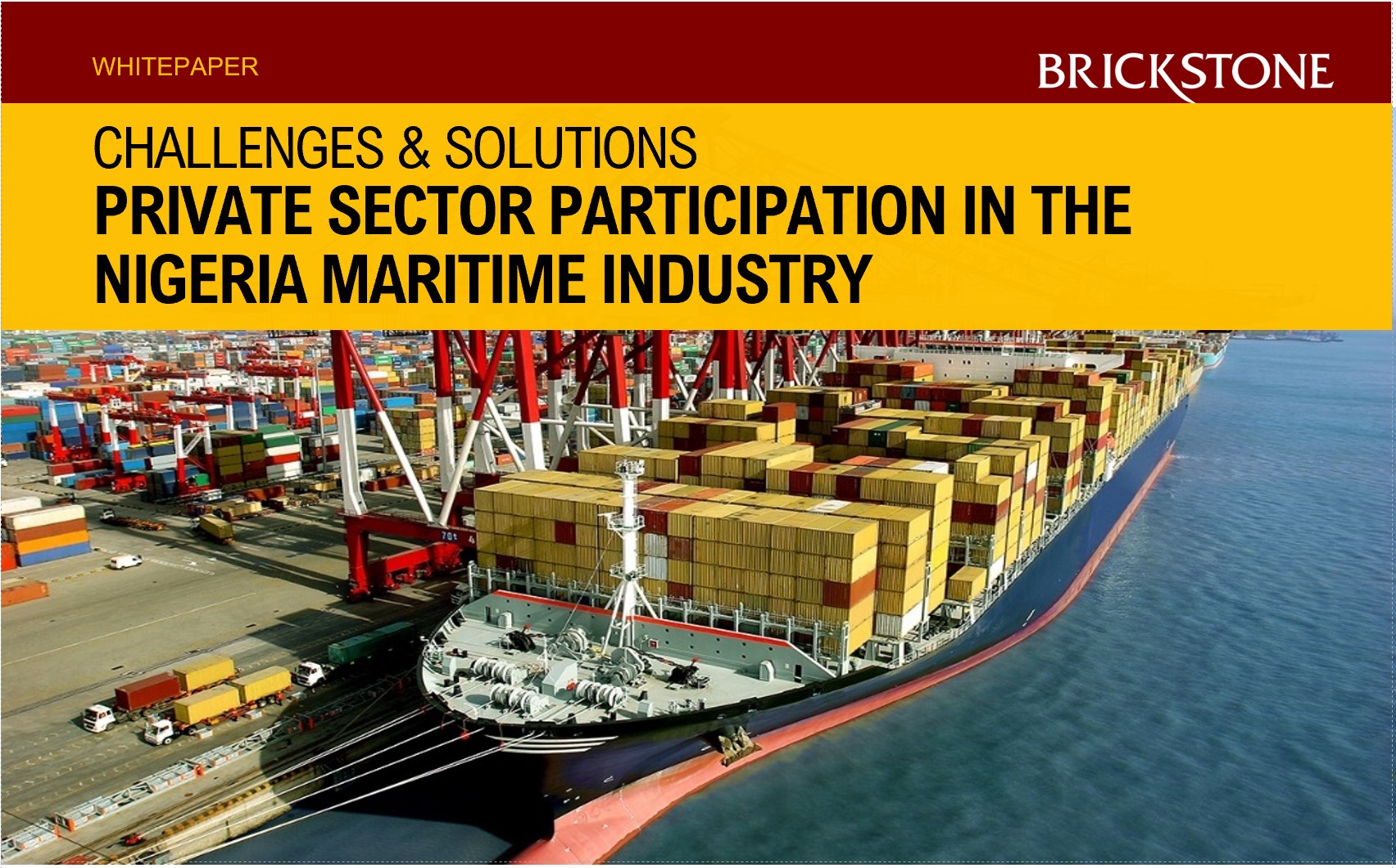Private Sector Participation in the Nigeria Maritime Industry: Challenges & Solutions
Private Sector Participation in the Nigeria Maritime Industry: Challenges & Solutions
Introduction
There is no gainsaying the fact the Nigeria maritime industry plays a prominent role in the economy of most nations. As a matter of fact, events around the world have shown that the maritime sector, when handled rightly, can go a long way in the reduction of poverty, wealth creation, skills acquisition promotion and encouraging entrepreneurship.
The Nigeria maritime industry, if well harnessed, not only has the capacity to boost a country’s economic development but also contribute very significantly to the growth of the national gross domestic product (GDP). Some of the opportunities the sector can bring include: providing a platform for global shipping and commerce; act as a source of renewable energy; enabling fisheries, tourism, maritime transport and infrastructure, to mention but a few.
Furthermore, the Nigeria maritime industry has for some decades now, been bedeviled by myriads of challenges including but not limited to paucity of funding/financing and public private partnership (PPP), inadequacy of the legal and regulatory framework, inadequate incentives for private investors, lack of political will and inconsistencies in policy formulation.
It is against the foregoing background that this publication underscores the need for collaboration between the Nigerian government, industry stakeholders and private investors.
Nigeria Maritime Industry
Nigeria, located on the coastline corridors of the Gulf of Guinea and the Bight of Benin, is blessed with a natural maritime endowment base comprising a coastline of over 850kms, an exclusive economic zone of over 200 nautical miles, a vast inland waterways resource estimated at nearly 4,000kms, capable of supporting a vibrant intra-regional trade. With Nigeria‘s total annual freight cost, estimated at between $5 billion and $6 billion annually, there is no doubt that shipping is of great importance to the Nigerian economy (NIMASA 2018).
The Nigeria maritime industry includes all enterprises engaged in the business of designing, constructing, manufacturing, acquiring, operating, supplying, repairing and/or maintaining vessels, or component parts thereof: of managing and/or operating shipping lines, stevedoring and customs brokerage services, shipyards, dry docks, marine railways, marine repair shops, shipping and freight forwarding services and similar enterprises.
Put succinctly, the Nigeria Maritime industry embraces all the maritime related business activities which take place within the country’s maritime environment. These include offshore economic activities such as fishing, salvage, towage, underwater resources and on-shore economic activities such as port activities, maritime transport (shipping), ship construction, repairs and maintenance activities.
Maritime Industry Participants
The Nigeria maritime industry is mostly dominated by the following players; the Nigerian Maritime Administration and Safety Agency (NIMASA), Nigerian Ports Authority (NPA), Nigerian Shipowners Association (NSA), the Nigerian Shippers Council (NSC), Ministry of Trade and Transportation, operators, finance institution and private investors.
The Legal and Regulatory Framework for the Nigeria Maritime Industry
In this section, a brief overview of the extant legal and regulatory framework (limited only to principal legislation and potential changes in law) for the Nigeria maritime industry is provided:
- Nigerian Maritime Administration and Safety Agency
(NIMASA) Act 2007: NIMASA Act establishes NIMASA and saddles NIMASA with the responsibility of pursuing the development of shipping and regulating matters relating to merchant shipping and seafarers in Nigeria. Other statutory functions of NIMASA include but not limited to: regulation of safety of shipping as regards the construction of ships and navigation; administering the registration and licensing of ships. - The Coastal and Inland Shipping (Cabotage) Act 2003:
The Cabotage Act was enacted in response of the increased demand of Nigerian stakeholders within the Nigeria maritime industry for legislative intervention to stimulate the participation of Nigerians in its domestic coastal trade. The Cabotage Act restricts the use of foreign vessels in domestic coastal trade (including carriage of good and passengers in Nigerian waters), promotes the development of indigenous tonnage and establishes a cabotage vessel financing fund. - Nigerian Ports Authority (NPA) Act: The NPA Act empowers the NPA to maintain, improve and regulate the use of the ports; ensure the efficient management of port operations; provide and operate ports facilities; form, establish or incorporate subsidiaries or affiliate companies with other persons or organisations for the purpose of carrying out any of its functions.
- Merchant Shipping Act, 2007: This Act provides for merchant shipping in Nigeria and allows only registered Nigerian ships to operate commercially in the Nigerian to the exclusion of others except for statutory exempted cases.
- Potential Change in Law: There are currently some bills pending before the National Assembly capable of affecting the Nigeria maritime industry when passed. They include: the Anti-piracy Bill; the Establishment of the Nigerian Marine Development Bank Bill; Inland Fisheries Act (Amendment) Bill 2017; the Deep Offshore and Inland Basin Production Sharing Contract (Amendment) Bill 2016; and the Cabotage Act (Amendment Bill) 2017.
KEY CHALLENGES FACING THE MARITIME SECTOR
Some of the key factors that influence the development of shipping industry in Nigeria include: inadequate financing, inefficient ports infrastructure, deficit in maritime infrastructure, inefficiencies, lack of transparency and sharp practices.
- Inadequate Financing : The Nigeria maritime industry is highly capital intensive and financing is very pivotal to increasing private sector participation in the maritime industry. This is true for the maritime sector in Nigeria.
- Inefficient and Inadequate Port and Shipping Infrastructure : Decaying port infrastructure is another challenge facing the Nigeria Maritime industry. Port infrastructure, as used in this context includes: Ports, terminals, cargo handling equipment, channels and harbours, warehouses, ports access roads, intermodal transport involving rail and roads interfacing with ships and badges, utilities, information communication technology (ICT), deep seaport and scanners.
Download full paper below:
OTHER E-BOOKS THAT MAY BE OF INTEREST
Developing Information Memorandum for Large Projects
Template for Strategic Business Plan
Template for Feasibility Studies for Large Scale Projects
Why not contact us to make your Project Happen
Our advisors and consultants would be able to schedule an online meeting with you to discuss your project with the overall objective of seeking ways to achieve the “bankability” and protection of the long term asset value of your project. Request a Meeting Now








